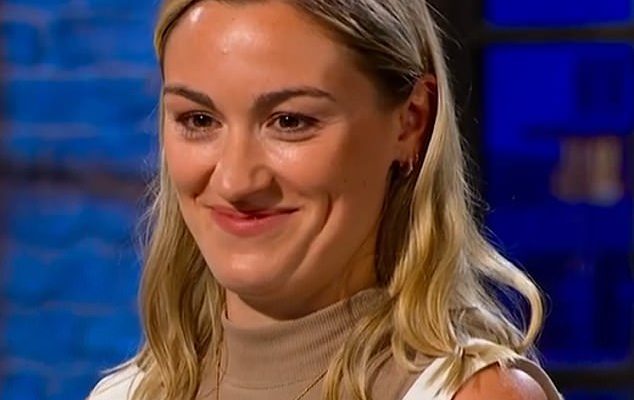The chance to pitch your business to potential investors in Dragons’ Den sounds like a dream to many entrepreneurs and you might imagine battling thousands of other hopefuls for a change to appear on the show.
But this week it emerged that producers actively recruit business owners to appear on the programme, as well as discovering people via casting call outs.
It comes after entrepreneur Giselle Boxer accused of ‘selling snake oil’ by claiming her ear seeds helped ‘cure’ her ME said she was recruited by a researcher for the show, while a second businesswoman, Zoe Young, 47, from Checkendon, has also since claimed she was approached by the BBC to appear on the series.
Meanwhile, an heir to the Cadbury dynasty, who ultimately turned his back on a £75,000 Dragons’ Den deal, said that he too was approached to appear on the show with his ethical chocolate brand Love Cocoa in 2018.
He said a researcher had tried one of his chocolate bars and ‘loved the story and ethos’ and that after a ‘quick 1-minute audition’ he was on the show within three to four weeks.
Speaking to FEMAIL, the BBC confirmed that Dragons’ Den does ‘approach businesses’ to appear on the show.
Giselle Boxer (pictured), 31, from Sheffield, appeared on the series last week and asked for £50,000 for a 10 per cent stake in her business selling ear seeds, which she claimed helped ‘cure herself’ from myalgic encephalomyelitis (ME).
A spokesperson said that Dragons’ Den ‘has always encouraged entrepreneurs to apply to appear on the show. Whether we approach businesses or find people via casting call outs every applicant goes through the same rigorous processes before they make it on to the show.’
Those looking for a slot on Dragons’ Den need to apply online and the BBC’s website explains that as ‘part of the normal selection process we may approach entrepreneurs, or they may apply direct’.
It continues: ‘To be considered, all candidates need to submit an application form and these are then subject to the same casting criteria.
‘Once shortlisted for consideration applicants will enter due diligence, but ultimately the final selection for participation will be decided on a number of factors and the producers’ decision is final.’
However, James’ account of his experience of going into the den sounds less than ‘rigorous’ after he was initially approached.
‘The first stage was to do a quick 1-minute audition in London which was speaking into a camera,’ he wrote. ‘I had a few attempts at it before finally producing a good one which our researcher liked. This was sent to the production executive to give the thumbs up.
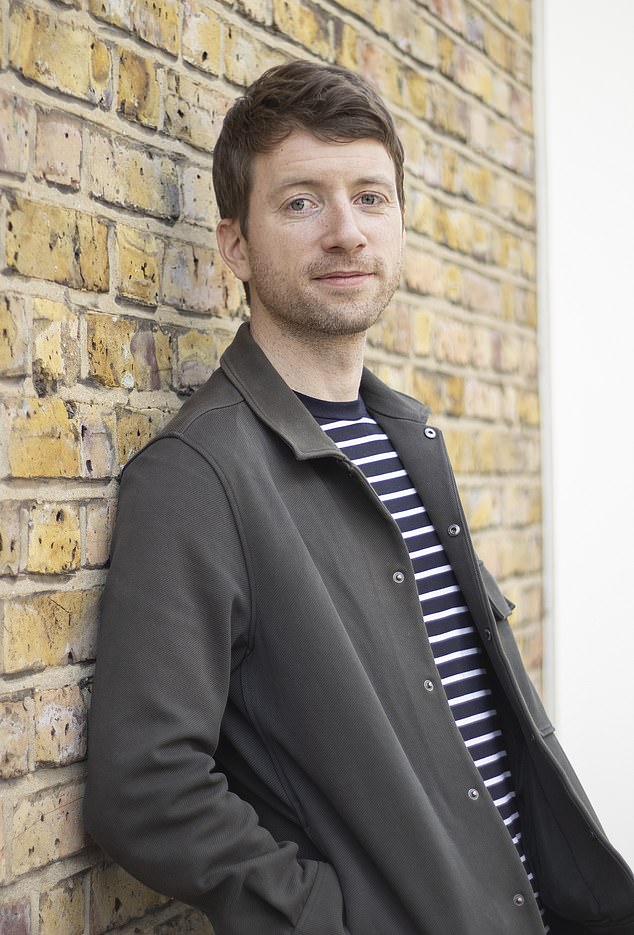
James Cadbuy, pictured, who set up his own £14m chocolate business without a penny of his family’s money, was recruited to be on Dragons’ Den after a researcher tried one of his chocolate bars
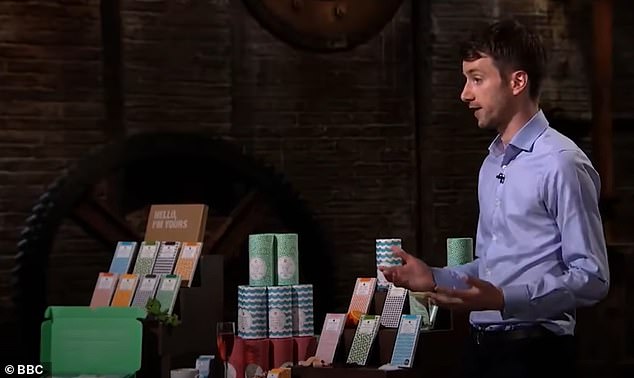
James claims he underwent a ‘quick 1-minute audition’ for the first round of applications for the show
‘With filming having already started for the season, the turn around was very quick between the audition and the actual pitch with it being only 3-4 weeks.’
In 2022, an alternative brewery Neitiv, based in Swindon, published a blog post detailing their own Dragons’ Den experience in which the founders claimed they were ‘convinced’ to pitch to the dragons by the show’s producers.
In the post, the brand’s founder Vaani Vetriko claims the business was ‘approached by the show producers’ just one month after their Coconut Flower Beer had been launched.
‘Our initial reaction was pure disbelief, as we [had] not done any marketing at that point,’ she wrote.
‘Our response was ‘ ‘we are not sure if this is the right time’. We felt it was too early because our business did not have any financial track record to present to the Dragons as that is always the most important factor in seeking investment.
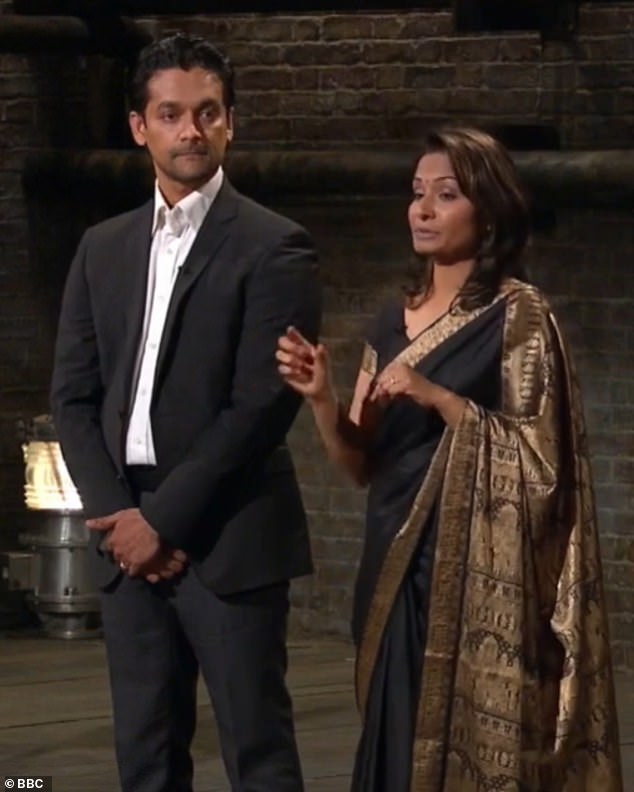
Vaani Vetriko and her business partner Keeran were ‘convinced’ to take part in the show early on after launching their brand Neitiv
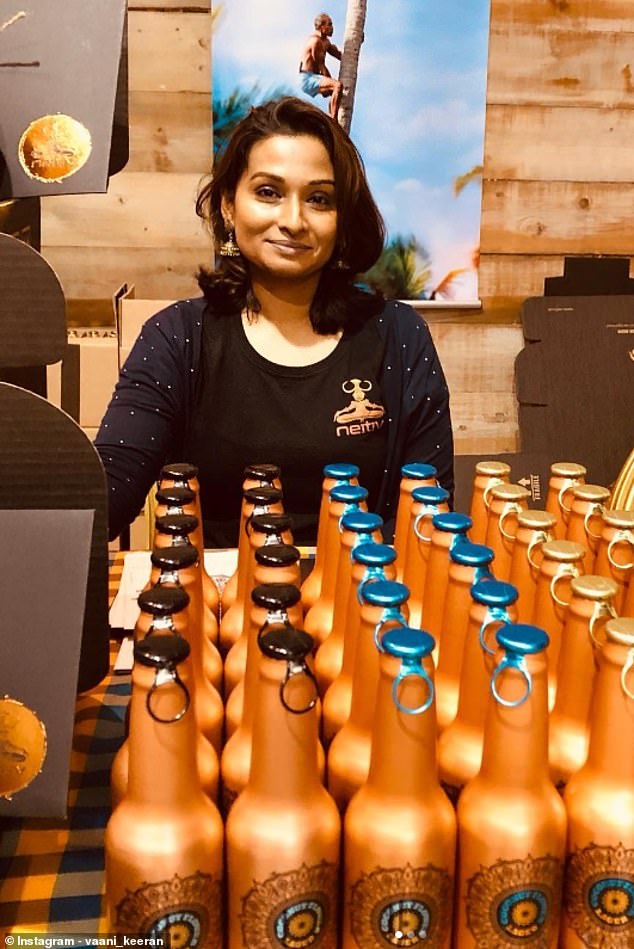
Vaani (pictured selling Neitiv beer) wrote a blog post on the Neitiv website claiming she and Keeran were approached by Dragons’ Den producers just a month after their first product launch
‘However, the producers convinced us to participate.’
Another entrepreneur who appeared on the show revealed he was also approached ‘out of the blue’ by producers, who contacted him via email.
Jacob Thundil, founder of Cocofina, appeared on the show in 2016 and received a £75,000 cash injection from Nick Jenkins and Sarah Wallingham. Unfortunately the deal later fell through because Jacob could not provide essential documents relating to the company’s accounts.
He told The Sun: ‘When I opened the email I thought it must have been a scam and nearly ignored it. I was waiting for them to ask me for money.
‘I was so cynical that I called up the BBC to find out if it was real. ‘I didn’t believe it because I considered myself normal and thought, ‘Why would they contact someone like me?’
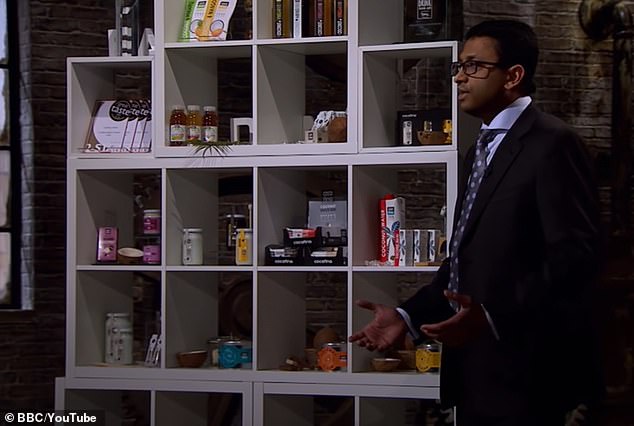
Jacob Thundil, founder of Cocofina, appeared on Dragons’ Den in 2016 and secured a £75,000 investment for his business
The accounts come as the BBC is embroiled in rows over the application process for the show, after an entrepreneur came under fire for her supposed ‘cure’ for chronic illness ME.
Giselle Boxer, who appeared on last week’s episode, told the Dragons that she sells £30 gold plated ear seeds, while on maternity leave, after she used a similar product to ‘cure herself from ME’, a long-term condition that causes extreme fatigue, sleeping difficulties and brain fog.
She secured an investment from Steven Bartlett, who has not commented on the backlash. His brother Joshua Bartlett is listed as a director for Acu Seeds on Companies House. Steven has also shared pictures of meetings with Ms Boxer in recent days.
But now various doctors and myalgic encephalomyelitis (ME) sufferers have hit out at the BBC and the business for promoting an alternative medicine with no scientific evidence it can help ME or fatigue.
A BBC spokesperson said: ‘Dragons’ Den features products from entrepreneurs and is not an endorsement of them. Dragons’ Den shows real businesses pitching to investors to lift the lid on what happens in the business world.’
Referring to Giselle Boxer, they added: ‘This episode features an entrepreneur sharing their own, personal experience that led to a business creation,’ while noting that the entrepreneur’s website features disclaimers to always seek medical advice.
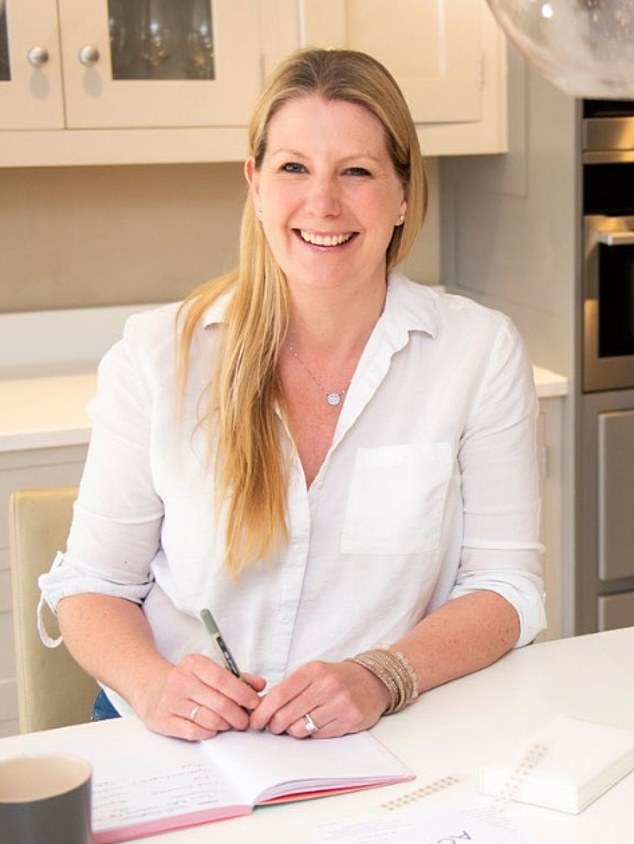
Zoe Young, 47, from Checkendon, said that she was approached by the BBC to appear on the show, and told producers of her main competitor – Acu Seeds
However, the broadcaster was put under further scrutiny after Ms Boxer claimed she was asked to apply for the show.
She told The Mirror: ‘Funnily enough they contacted me and I received an email from a researcher there and I initially thought it was a spam email.
‘We went through the different stages of the application process and there was so much due diligence and they really looked into every part of my business before I went in to pitch to the Dragons.’
Businesswoman Zoe Young said she was also approached by the BBC to appear on the show, and told producers of her main competitor – Acu Seeds.
She warned them that Giselle was not a qualified acupuncturist and that ear seeds are not a cure for M.E, adding: ‘She had come along into the market as a social media expert, no background in traditional Chinese medicine.’
Speaking to FEMAIL Zoe said: ‘They encouraged me to apply. The questions they asked in the process were so lengthy and strict. They asked me what every placement on every ear map meant, really in depth questions.
‘They asked me if I have any rivals and I told them about Acu Seeds. I told them that she didn’t have any background in Traditional Chinese Medicine and that we were in litigation with them’.
Zoe, who is a practising acupuncturist, added that she started selling ear seeds and trademarked her name ‘Acupips’ during the Covid-19 lockdown as she was unable to see patients and it meant they could treat themselves at home.
She added that there are legitimate benefits of ear seeds, but their portrayal on the show and the backlash has been ‘very damaging’ for acupuncturists.
Although this case has raised questions about due diligence in assessing potential entrepreneurs to appear on the show, some previous hopefuls have insisted they were made to follow strict application rules.
After agreeing to take part in the show, Vaani of the Neitiv brand revealed there was a ‘rigorous’ due diligence process to complete before they actually won a spot to pitch to the businessmen and women.
‘Everything we presented and said on the final show had to be backed up with fact checks and proof of authenticity,’ she wrote in her post.
Jacob, too, revealed the application process was ‘painful’ despite the fact he had been approached by producers. He explained he underwent a rigorous fact-checking process to ensure all claims made by the entrepreneurs were true.
Meanwhile, the ME association has reported Acu Seeds to the Advertising Standards Agency and written to the BBC and chairman of the Commons culture, media and sport committee and chairman of the health and social care committee.
‘People who have ME/CFS are often on very low incomes and in the absence of any effective medical treatment are very vulnerable to these sort of unsubstantiated therapeutic claims.
‘They are fed up with the way in which unproven and expensive treatments are regularly being promoted to them.
‘This programme has therefore caused a great deal of upset and anger in the ME/CFS [Chronic Fatigue Syndrome] patient community,’ the letter reads.
It adds that during Dragons’ Den none of the panel asked any questions about ‘validity Acu Seeds in ME/CFS and whether there was any scientific evidence of safety and efficacy for this product’.
Dr Charles Shepard, Hon Medical Advisor for The ME Association, said: ‘The way in which Dragons’ Den has been used to promote an unproven treatment for ME/CFS has, not surprisingly, caused a great deal of upset and concern in the ME patient community.
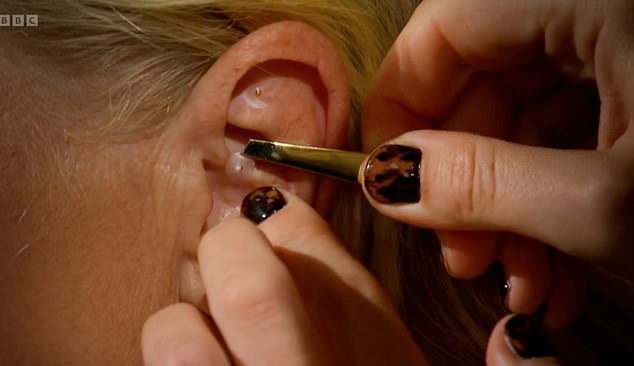
On the show, Deborah Meaden tried out the technique before making an offer
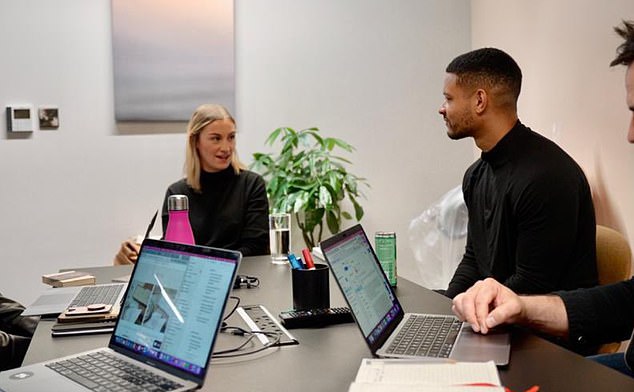

Steven, who invested £10,000 in Acu Seeds, has shared photos of the team on X
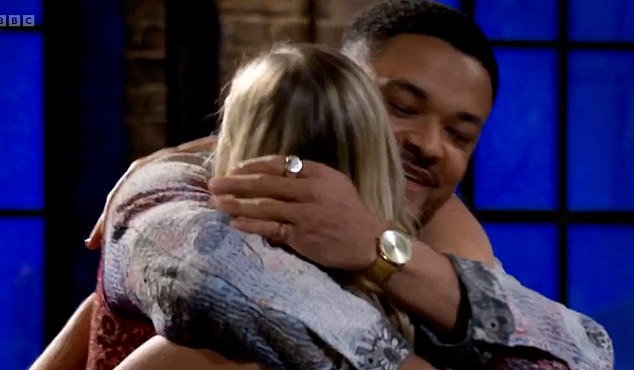
The new business partners embraced before Giselle said working with Steven was a ‘complete dream come true’
‘People with ME/CFS are fed up with the way in which products like this are regularly being promoted when there is no sound evidence from proper placebo-controlled clinical trials to confirm that they are safe and effective.
‘These sort of expensive commercial products and devices should not be promoted to very vulnerable sick people until they have been properly assessed for safety and efficacy in clinical trials – in exactly the same way that drug treatments are.’
And he’s not the only doctor pushing back against the product. Dr. Edzard Ernst, an MD and PhD who specialising in research around alternative medicines said there is ‘no good evidence’ to support any of her claims.
‘There is no sound evidence that these acupressure devices are effective for ME or other conditions.
‘To give severely suffering patients false hope is unethical; to take money from it is despicable, in my view.
‘I am disappointed that the BBC uses a light entertainment programme for misleading gullible consumers and desperate patients. I hope in future the BBC might do a minimum of research before broadcasting overt medical nonsense,’ he told FEMAIL.
Other people who suffer from ME and chronic fatigue syndrome have taken to social media to complain.
One TikToker, called Rebecca, who shares videos about her ME said: ‘As if it’s not bad enough she’s bragging about buying them for £3 and selling them for £30, with her gigantic gross and net margins, well it turns out she’s also selling people in her club snake oil’.
In the episode, Giselle said she went form being an advertising executive with a busy social life to unable to leave the house.
She says she was diagnosed with ME and told by doctors she would never recover or be able to have children.
Giselle then became pregnant. There is no evidence that ME reduces fertility rates but some related ailments — such as irregular periods and endometriosis — can make it harder to conceive.
She gave up her career in advertising to become a stay-at-home mother. While on maternity leave, she decided to launch her own ear seed business.
She spent 18 months building her business using just £5,000 of her own savings and managed to make a healthy profit her first year.
The mother of a three-year-old daughter then made Dragons’ Den history as she became the first contestant to get an offer from all six judges.
In her pitch, she said: ‘My business is the ideal mix of beauty and wellness. Today, I am asking for £50,000 investment for 10 per cent of my business.
‘Four years ago I was diagnosed with ME. I went from working in a top advertising agency with a busy social life and exercising regularly to being mostly housebound and being unable to walk more than five minutes without having to get back into bed.
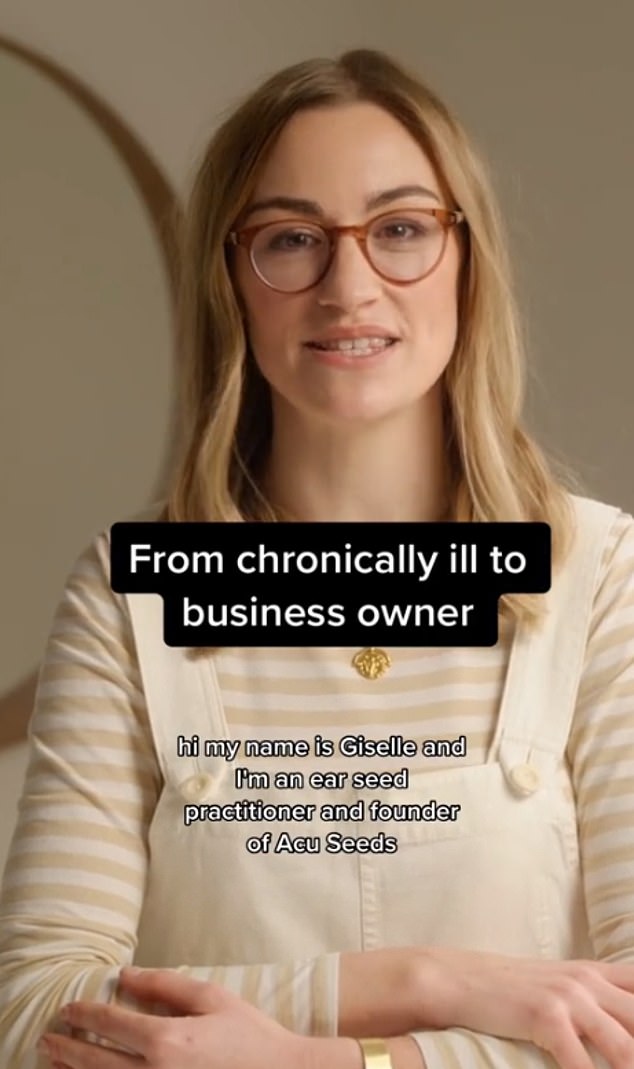
Giselle often takes to Instagram to share how she was ‘cured’ from Chronic Fatigue Syndrome
‘I was told by doctors that I would never recover, work again or have children. I went on a personal healing journey using diet, acupuncture, Chinese herbs and ear seeds.
‘Using this combination, I believe, helped me recover in less than 12 months.
‘Soon after, I felt pregnant and it was while on maternity leave that I setup Acu Seeds after realising there was a gap in the market for ear seed kits for people to use at home’.
Ear seeds were invented by Dr. Paul Nogier in the 1950s and are similar to an ancient Chinese medicine tool, which uses the principles of acuprssure but without the needles.
Giselle said: ‘They are tiny beads that stick onto the ear applying pressure on to nerve endings.
‘They send signals to the brain and body to relax the nervous system, release endorphins and naturally relieve pain.
‘I work on this business for three days a week and spend the rest of my time working with my three-year-old daughter.’
Giselle told the dragons that the ear seeds she was using in her battle with chronic illness were not ‘very beautiful’ and were ’embarrassing’ to have on your ear. This inspired her to design her own more discreet ear seeds.
She has been running the business for 18 months and generated £92,000 in revenue in her first year and a healthy £64,000 net profit – which the dragons found very impressive.
She spent £5,000 of her own savings to get the business off the ground and took a £31,000 salary – and still managed a healthy net profit.
Sara Davies said: ‘Honestly, I have nothing to fault you on. That is all shaping up really well so far.’
Asked about her vision for the brand, Giselle said she wants it to be ‘as big as it can possibly be’.
She said: ‘When I got pregnant, I thought I wanted to be a stay-at-home mum because I had been working in marketing which I didn’t have much passion with.’
But she has found she is very passionate about her business.
Gary Neville said he couldn’t go home if he didn’t invest as his mother, sister, wife and two girls would ‘never forgive’ him. He offered her all the money – £50,000 for 10 per cent of the company.
Deborah Meaden said she ‘it would almost be rude’ not to offer her all the money for 10 per cent of the business.
All the other judges offered Giselle what she was asking for – apart from Diary of a CEO host Steven Bartlett who offered her £50,000 for 15 per cent.
He said she was ‘un-uninvestable’ and made the case that he was ‘the dragon to take on the business’. He offered her the money she wanted for a bigger stake in the business – 15 per cent.
To which, Peter Jones quipped, ‘oh, you don’t want it then’ while Gary Neville said: ‘He’s not a dragon, he’s a snake’.
Steven calmly responded: ‘You can see from the reaction of these two… it says something doesn’t it. I’ll leave it at that because I know what I can do for this business.’
It is the first time in Dragons’ Den history that all the judges made an offer to invest.
‘I don’t know if you believe in spirituality and all this stuff but I was told I was going to meet a man called Steven and that he was going to be really important. This was before any of this happened. So, I would really like to work with you [Steven].
She asked if he would be ‘flexible’ on his 15 per cent offer and asked if he could do 12.5 per cent — which he accepted.
The new business partners embraced before Giselle said partnering with Steven was a ‘complete dream come true’. Giselle said: ‘I feel like I want to cry. I just want to make my daughter proud’.

